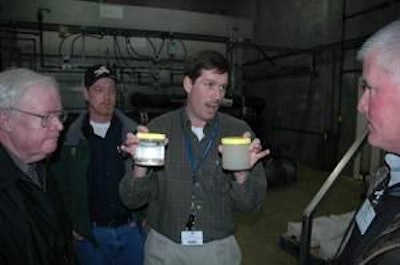
The Wayne Farms further processing operation in Decatur, Ala., has won the 2010 Clean Water Award in the wastewater pretreatment category.
Facing potential cost increases when the local publicly owned treatment works (POTW) set a schedule of tiered wastewater surcharges, Wayne Farms introduced innovations in jar testing and polymer mixing in its wastewater pre-treatment system and cut chemical costs and effluent surcharges – a rare feat since these costs typically don’t move in the same direction but counter one another.
The management teams at the Decatur-West and Decatur-East further processing plants cleared the way for Jesse Fletcher, who heads both wastewater treatment and maintenance at the facilities, to develop and apply surprisingly effective solutions.
The new approaches in jar testing and polymer mixing, combined with the application of SCADA monitoring, are reportedly saving the company in excess of $260,000 a year.
The automation of these wastewater treatment processes has also saved labor.
Automated jar testing
Fletcher introduced automated jar testing to eliminate direct discharges to the POTW. He explained, “The objective was to eliminate the gross system upsets that are a common problem in the industry with marinades, oils and other substances often going down drains and with little warning.”
The automated jar testing is a computerized, PLC-based system which measures effluent turbidity in the pipe after dissolved air flotation (DAF). Four turbidity tests are automatically performed on a daily basis. A sensor measures post-treatment turbidity after the cationic, anionic and coagulant agents are added. A consistent dosage is maintained by a flow meter and VFD through a PLC. A sensor on the effluent triggers a jar test if turbidity rises above a set point.
Since implementation in April of 2008, the automated jar testing has successfully controlled the levels of biological oxygen demand (BOD), oil and grease and total suspended solids (TSS). There has been no POTW surcharge during this period. At the same time, the jar testing has decreased chemical consumption and reduced labor.
Polymer optimization
The Decatur operation uses dry polymers to save cost, but was experiencing a problem with their effectiveness. A mixing system was developed by Fletcher and his team to improve polymer effectiveness and consistency. The mixing system has the added advantages of decreasing polymer consumption and reducing labor costs.
Polymer is fed from a volumetric screw feeder, into a radial mixer, which adds water, and through an eductor under vacuum.
Polymer is fed into the radial premixer at a lower rate than would be accomplished with the use of a hootenanny. This not only provides for more effective pre-wetting prior to entry into the eductor but reduces shearing of the polymer by reducing the mixing time.
Maintenance personnel check and fill the hoppers on the screw feeders every four hours. Sensors provide alerts of any problems.
SCADA system
Labor has also been reduced through the installation of a supervisory control and data acquisition system (SCADA).
“We have eliminated quite a bit of labor cost in the wastewater treatment plant, and the remaining tasks have been assigned to the utilities department. Also, the SCADA system has allowed us to move operator control to multiple locations, including the utilities office, my office and the wastewater treatment plant,” Fletcher said.
Home-grown innovation
Innovative thinking at Wayne Farms-Decatur has resulted in big increases in efficiency with very small investment. This is a testament to the role of talented people backed by management willing to allow staff the freedom to try new approaches.
As a result, Wayne Farms-Decatur has a better relationship with the local municipality due to the elimination of any non-compliance issues involving wastewater treatment. At the same time, chemical usage has been cut by $141,000 a year, labor cost has been reduced by $67,000 a year, and $148,000 in wastewater surcharges have been eliminated.


















